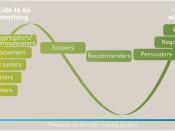INTRODUCTION
For decades scholars and practitioners have been frustrated by the very capacity of either psychological or marketing models to predict consumer behaviour. It is essential therefore to try to clearly recognise the many problems, in trying to understand consumer behaviour in a precise, reliable and significant way.
'The study of consumer behaviour is at this time seen as a 'behavioural or social science.' There are many that would challenge that this is a misnomer although it is not strictly a 'science', in it purest form when compared with the 'Natural' and 'Mathematical sciences'. Watson states, "Behavioural Science is a purely objective experimental branch of Natural Science."
To understand the real reasons people purchase one brand over the other, it is necessary to understand their underlying needs and concerns.
In the past the theory of consumer behaviour has come from psychology; however, with further study sociology, anthropology and economics also contribute.
According to Ray Wright (1999), 'Behaviour could be used as a means of segmentation, whereby buyers are divided into groups according to the attitude and behaviour shown towards products and companies.' This is influenced by factors that marketers cannot directly control. The understanding of its impact is crucial, as marketing mix strategies can be developed to appeal to the references of the target market. Once the consumers' decision making process and buying behaviour processes have been assessed, the 4P's can be developed in line with consumers' needs and wants - i.e. the type of product required, price range, place and promotion. The 4P's, aim to satisfy the consumers' needs and
wants. This emphasises the marketing concept, that customer orientation is the key to an organisation's success.
SOCIAL/CULTURAL INFLUENCES:
CULTURE:
People learn basic values, perception and wants from the family and other important groups. Cultural factors may influence marketing strategy...



GooD essay
ya thanks for the essay it was of great help. contains alot of good info
4 out of 4 people found this comment useful.